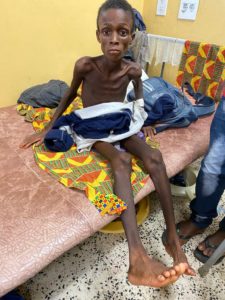9 million people die from hunger each year. This number may double thanks to the lockdowns that have been imposed in the world’s poorest countries. Even before the lockdowns, about half the world lived on less than $5.50 a day. 10% of the population lived in extreme poverty, which is defined by the World Bank as less than $1.90 a day. On the other hand, the average American lives on $164.55.

I was ignorant of global poverty until a few years ago. The stories I learned about and the photos I saw were heartwrenching. Even though I immediately wanted to help in some way, the problem seemed completely overwhelming. Any amount I gave felt like a tiny drop in the ocean. Since then I have been trying to learn everything I can about poverty: what causes it, what works to alleviate it and what doesn’t, and what I can do to help. Unfortunately, the more I’ve learned, the more complicated it all becomes.
Problem-solving in general is a messy process of trial and error. Sometimes the proposed solution fails immediately. Sometimes solutions work in the short term but create worse problems down the road. The documentary Poverty Inc (currently on Amazon Prime Video) highlights some of the major problems with how poverty alleviation is being done. Many times, when charities or well-intentioned governments try to fix a problem, they end up making things worse. Here are some examples:
- Subsidized rice from America gets dumped into Haitian markets which makes rice cheap for Haitians but pushes the Haitian rice farmers out of business and ultimately hurts the Haitian economy, and thus the Haitian people, overall.
- Impoverished parents abandon their children at orphanages because the orphanages provide a higher quality of life than they can give. 80% of children living in orphanages are not orphans. This has catastrophic consequences.
- Free clothes being sent by charities in America to Africa pushes the African clothes makers out of business and lowers the demand of all the other local industries that would otherwise support clothes making. It’s almost impossible to compete with free.
It’s tempting to just throw your hands up and say the problem is too complicated, that there is no hope. But there are stories of success. Amy Hathaway founded an organization called Forever Angels. She saw how the traditional orphanage system was tearing families apart, and she changed how her organization did things. Forever Angels now puts family preservation first. Previously a baby would be given to the orphanage because the mother died in childbirth. There were relatives who would have loved to take care of the baby, but they could not afford the formula milk needed. Amy saw that by giving the family formula milk, the babies would be well-fed and well-loved by their families in their own homes. Of course, the question then becomes, what happens when the baby starts to grow up and is too old for formula milk? Forever Angels work with the families to train them in entrepreneurship, which helps these families create a sustainable income for themselves.
Entrepreneurship is a win-win solution. The person living in poverty can pull himself out of it, and provide for himself and his family. He can sustain himself for a lifetime. This can have a ripple effect throughout the entire local economy: the new entrepreneur has more money to buy things from other local businesses, which in turn benefits the other shop owners, and so on, and so forth. Eventually, the economy is robust and thriving.
As an American, I struggle with how to reconcile the realities of extreme poverty and extreme wealth. How can I justify ordering a pizza when I know that my $20 could help feed severely malnourished children in Cambodia? I’ve thought about this a lot for the past couple of years, and I’ve come to the conclusion that it’s an uncomfortable reality. Our country is so wealthy precisely because we have a free market and people have disposable income. The owner and employees of the pizzeria benefit from my ordering that pizza. Participating in my local economy helps keep it strong and keeps people here out of poverty.
On the other hand, I believe donating money to charities who are doing work that helps is also important. There are excellent projects on Donorsee that make it possible for people to donate to a specific individual who wants to start a business so that they can support themselves. I highly recommend Amy Hathaway’s projects. The over 80% of the people who start businesses after going through Forever Angels’ program succeed.
One phrase I’ve heard that has helped me to continue to give, even when the problem of global poverty seems overwhelming is this: helping one person might not change the whole world, but it could change the world for one person.